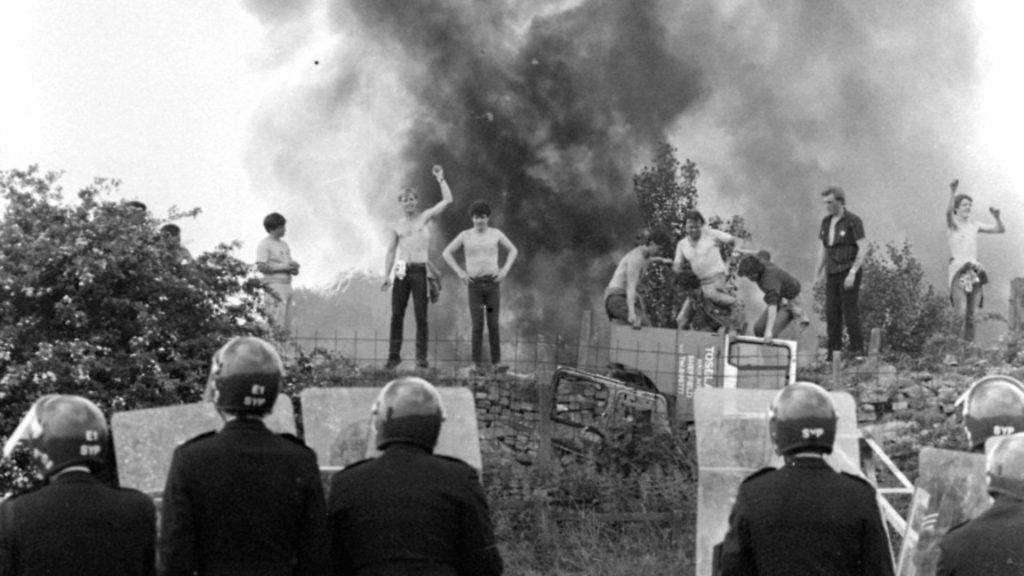
The working class were the key to Brexit. They must be the key to its defeat.

62% of EU referendum voters in South Yorkshire opted to Leave. It would have been higher, if not for the moderating effect of the pro-Remain Sheffield Hallam constituency (home to the largest population of professionals outside London) on Sheffield’s 51% Leave result.
Buried deep inside the gut of the South Yorkshire Leaver is a firm belief that Brexit is right for them, bringing much- needed change, because life inside the EU is bleak.
It is unsettling for the well-educated middle class socialist, unaffected by austerity, to suppose that many parts of Britain voted to leave the EU not simply because of the siren song of the Tory Brexiteers, but because of the complicit silence of the Labour leadership. By refusing to share a platform with David Cameron, Jeremy Corbyn symbolically stood against the Tory government, emitting the dog whistle to use the Brexit vote against the government, and bring Labour one step closer to power.
For two successive elections the South Yorkshire Labour voter had lost and had ended up with a Conservative-led government. This time the subversive Brexiteer element of the Tory party was seen to be on their side, working against the establishment, facilitating the change they desperately need.
The detail of the ‘Leave Lies’ of the Brexiteers are largely irrelevant, because brand Brexit stands for hope and taking control of our own destiny. In the 2016 Olympics, Yorkshire, had it been a country, would have finished 17th in the medal table; strong, competitive, team players. Yet this talented member of Team GB has for years been left on the subs bench, and aspires to more. Well paid employment, decent education, and the good health enjoyed in London. Within the EU, they do not have it.
I live with one foot in the champagne socialist Corbyn constituency of Islington North in London and one in what had been until June this year a centrist Lib Dem safe haven for Nick Clegg in Sheffield Hallam. On the night Britain voted to leave the EU, the London-based commentariat were left reeling, blinking in disbelief through the prism of their bubble. Never before had the difference between megacity and regions seemed so stark. But those of us who live in the ‘post-industrial archipelago of the North’ (to quote one of the oxidisers of Corbyn’s Momentum movement, Paul Mason) were not surprised.
The freedom of movement and the single market have been blamed for the inability of this region to scramble back to its feet after being knocked down twice; first in the 1980s when the steel and mining sectors were decimated, and then again hitting the canvas in the financial crash and the subsequent imposition of austerity on the public sector; the area of employment within which Blair and Brown’s Labour governments had provided supposed security. Things Can Only Get Better was the Labour campaign song when Blair swept into Number 10 in 1997. It could have worked just as well as the theme song for Brexit 20 years later.
To fully understand the events of June 2016, we must rewind 32 years to the events of June 1984, when striking miners were pitched against police officers in bloody battles at collieries, epitomised by the infamous Battle of Orgreave. When television cameras started rolling, the roughest, toughest men of the county were pitched into fists vs truncheon combat with the establishment. The unfolding scenes of crowds of miners being charged at by police on horseback are burned into the collective memory of the region, and have come to symbolise a merciless and violent crushing of dissent in the North by Westminster. As a result, South Yorkshire police became ‘untouchable’. (Only now is the legacy of this being revealed via the inquiries into Hillsborough and the Rotherham child abuse scandal.)
The striking miners were fighting the closure of a dying industry. They lost the fight. The pits followed the fate of the steel factories and closed. The employment for thousands disappeared, never to be replaced, some believe as a punishment for such resistance against the establishment. Thriving village mining communities became isolated pockets of poverty; poor health, poor transport connections, and poorly educated. The impact of the loss of expenditure in the local economy was devastating. The drug dealers moved in, and the first generation of never-to-be employed youngsters were born.
In June 2016, mining was dead. But despite the individualism that came to dominate our lives in recent decades the collectivist culture, and the National Union of Mineworkers, lives on.
Assisting a school in Doncaster I heard that 92 children of a year group of 150 had been identified as ‘at risk or vulnerable’. Yet there was no extra funding to help meet overwhelming mental health needs. The school leadership feared seeing fireworks bursting in the sky; not a precursor to bonfire night, but the signal that a new haul of drugs had arrived. When quizzed on career aspirations, many teenagers answered that the ‘dole job’ was good enough for their parents and so good enough for them. Attempts to leave the area or better their family members could be seen as disloyal and disrespectful.
Driving to a school in an ex-mining community near Rotherham I passed pro-Brexit graffiti. A simple ‘Vote Brexit’ in red spray paint was striking not only because there was no other graffiti to be seen amongst the tidy scrubbed-step dwellings, but because it shouted an explicit instruction loudly and clearly in the symbolic red of Labour.
The Rotherham child abuse inquiries of 2014 and 2015 brought to our attention what communities already knew. Child-grooming gangs of men of Pakistani heritage had been abusing vulnerable white girls from deprived communities and the authorities had been turning a blind eye. Families in areas of social deprivation had no voice, and the classification of these girls as wanton rather than preyed upon was symbolic of the disdain shown to these neighbourhoods. Fear of the ‘Muslim rapist or ISIS terrorist’ predator became palpable, exacerbated by front pages of the pro Brexit press, which could have gone largely unnoticed had they not been amplified by the coverage given to them by the BBC through broadcast and social media channels. UKIP found a home.
Anti immigration sentiment was not about degree-educated French waitresses or Italian baristas (they tend not to venture up here) but about a perceived threat to safety from local Muslims and leaky EU borders leading to more arriving some time soon. When the rumour spread that child groomers had started to turn their attention to the emotionally vulnerable teenagers of the wealthier leafier suburbs, the Tory Brexit vote was mobilised into action. The impact of this was most spectacular in June 2017 with the withdrawal of the ‘block out Labour’ vote they had previously lent to the pro-EU Clegg, (who had remained popular locally), ironically leading to the loss of his Sheffield Hallam seat to Labour. Perhaps liberalism is a luxury that is really only truly affordable when not feeling under threat.
Labour faces both ways on Brexit. The leadership knows that to win an election, they need to neutralise UKIP, mobilise the dormant Labour vote and be Pied Piper to the youth vote, but also to capture the Remain vote from the centrists; the academics and professionals who will be harmed by Brexit, after years of being relatively untouched by the effects of austerity.
The strategy has been to communicate different and contradictory messages to each echo-chamber; a pro single market theme for the commentariat through the intellectual brand of Sir Keir Starmer, but a ‘jobs first Brexit’ at the rallies by the man-of-the-people brand of ‘Jeremy’. Corbyn has visited the students and the dormant voters, and used the spoken word where literacy levels are pitifully low. They have heard it from the horse’s mouth, not through the filter and mansplaining of the broadcast media. Whether or not he fails, they believe he will try to help them.
The Remainers believe that to win their vote, Labour will go into reverse gear on Brexit. I would not be so sure. Perhaps ‘Jeremy’ is more likely to stand by the precariat than the commentariat; those who see him as their potential saviour, not those who will scrutinise his ideology.
Those who have enjoyed the benefits the EU brings most clearly and who perhaps will first feel the detrimental economic and lifestyle impact of leaving the EU the most, are faced with one simple but monumental challenge – to make sure the Labour Brexit voter will win by remaining in the EU. They must commit to extend the improved quality of life and employment that comes to many of us from being within the EU, to those who up until now have not experienced it.
To stop Brexit, the Brexiteers have to lose, and the working class Brexit voters have to be the winners in a future within the EU. To start, the appeal of following the Brexiteers must be diminished, and another way shown. This will not be by pointing out ‘Leave Lies’ but by demonstrating that Brexiteers are doing precisely what they promised not to do. Clegg paid dearly amongst his student and academic supporters not for failing to do something. But in agreeing to raise tuition fees he did something he promised he would not. We are used to dreams and aspirations not being fulfilled, we are accustomed to trying but failing. But reneging on a promise not to do something is very different.
Brexiteers promised not to let immigrants into the country. They promised not to inflict long term damage on the economy when leaving the single market. As negotiations begin, it is clear these promises will have to be broken.
This needs to be communicated not as a ‘we told you so – we must keep the status quo’, but a new action-oriented proposition should be presented: Let’s Exit from Brexit because there’s a better way to get the life you need. We heard your voice. You win. We will take action. Now let’s vote for that.
The power to do this really lies only in the hands of the Labour party. Perhaps with this scenario the Labour party, in collaboration with the Lib Dems and SNP, could truly achieve what is best for all of its supporters and keep this country where it belongs; as an invigorated and tougher, stronger reforming force within the EU, that makes sure that in the future no one is left behind.
Julia Muir is a veteran of the European automotive industry, founder of the UK Automotive 30% Club, and Sheffield-based Gaia Innovation Ltd, a social enterprise company that builds relationships between employers, schools and universities









